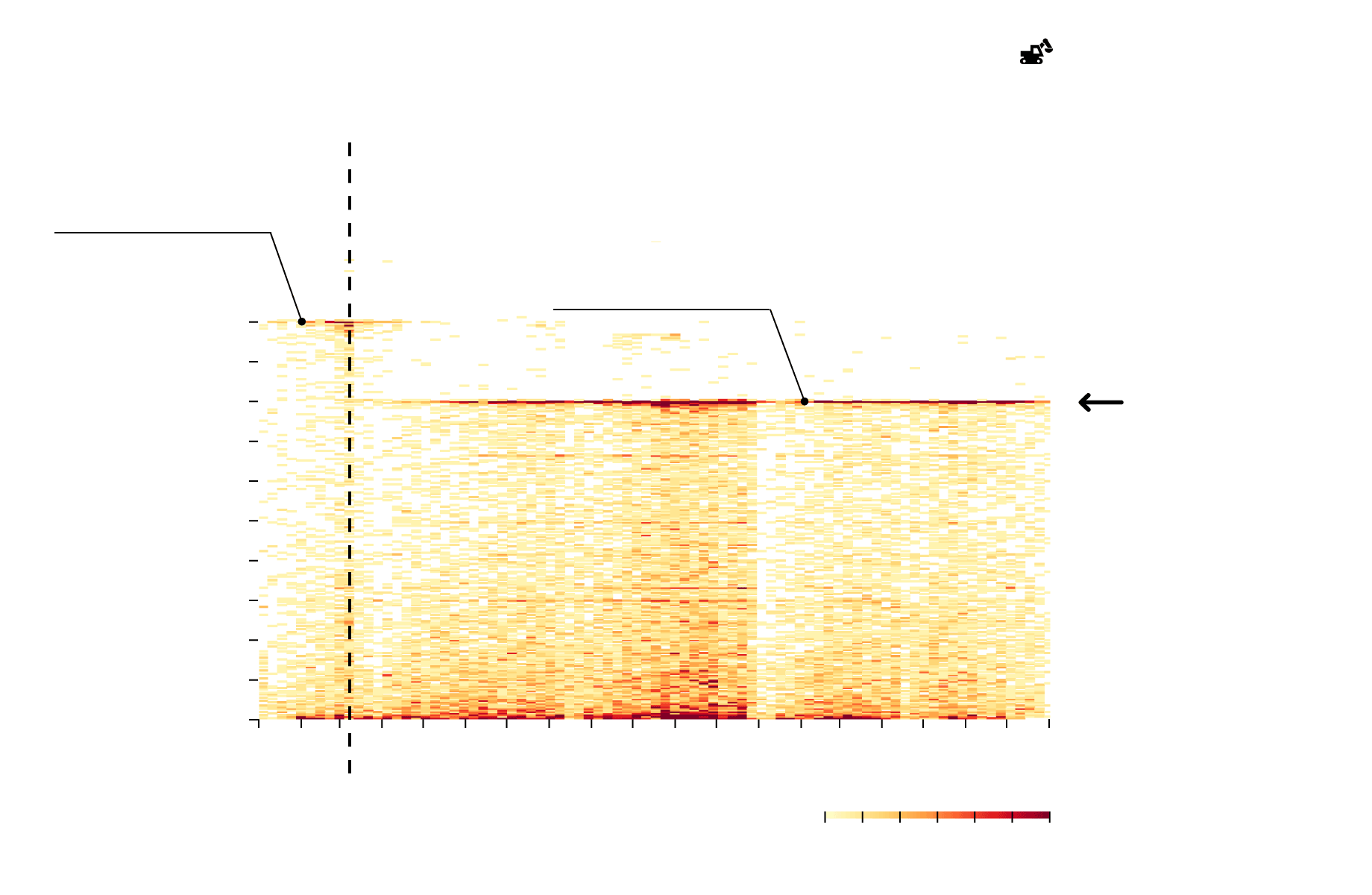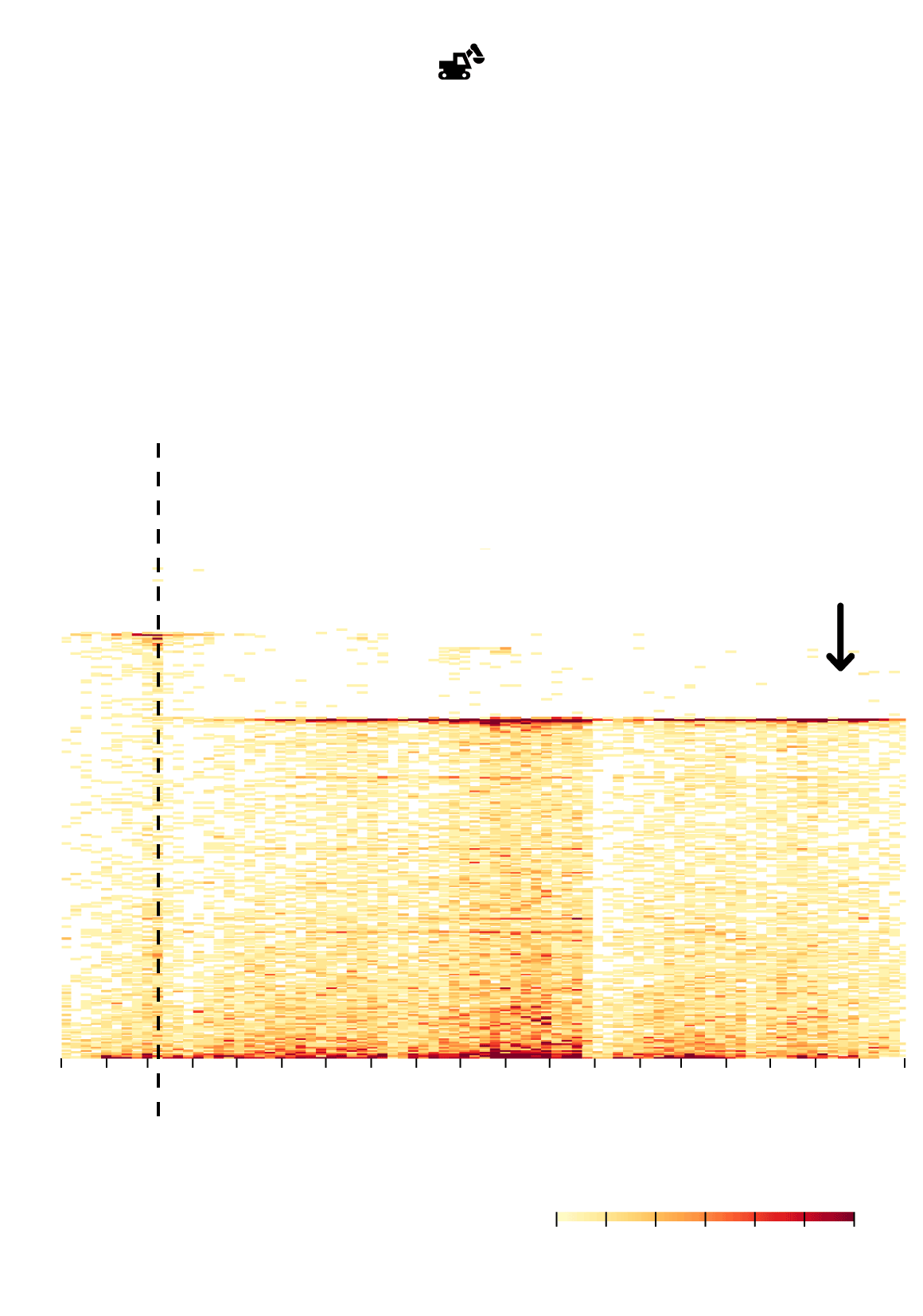
The invasion of the €14,999.99 minor contracts
Almost 10% of contracts awarded for goods and services are for sums of between €14,900 and €14,999.99, the legal limit.
In a single year, from August 2018 to July 2019, public authorities awarded over 35,000 minor contracts for goods and services exceeding €5,000. Almost 10% (3,261) are like lemmings perched on the edge of the cliff: they amount to between €14,900 and €14,999.99. Does this just so happen to be the most common market range for everything purchased or ordered by public authorities? No. Rather, it's the legal limit to be able to use a minor contract, awarded directly with almost no controls or transparency.
And if this limit changes—as it did with the amendment that came into force in March 2018, when it dropped from €18,000 to €15,000—then the price of many of these goods and services changes too, as if by magic. In 2017 and 2018, National Heritage contracted the firm Opyser to operate the ornamental fountains in the tourist attraction of La Granja de San Ildefonso, Segovia. Each year, a minor contract was signed with them for the precise sum of €17,999.99. In April 2019, with the new thresholds now in force, this same contract was modified to fall under the new limit and went down to €14,900. So we're paying less for the same service—or were we paying too much before?—and they can continue to hand out contracts directly without regard for due process in an open and transparent call for tender.
This is not by any means the only example we uncovered in the data of the Public Procurement Portal, which rounds up all of the minor contracts from most local, autonomous, and state public authorities. Autonomous governments contract credit ratings agencies to establish their own rating, i.e. their ability to pay off their debts or, to put it another way, what the risk of investing in said debt is. In both 2018 and 2019, the Government of Cantabria contracted one of the major agencies, Fitch. The difference between these two minor contracts? The first was for the sum of €17,999, just under the €18,000 limit; the second, with the amendment now in force, was for €15,000. This latter is a sum that, furthermore, is illegal, as contracts can only be awarded directly for sums of less than €15,000, not €15,000 exactly.

Some context to get started with:
contracts for goods and services of less than €15,000 and for works of less than €40.000 can be awarded directly and without further ado, and are known as MINOR CONTRACTSWhere such contracts are for really small sums,
for basic goods and up to a limit (less than €5.000), se an even simpler process can be used: the IMPREST FUND. Just pay and keep a hold of the invoice.So what's going on?
To avoid having to award the contract via a more complex, transparent process that allows more companies to submit bids, some authorities squeeze their contracts to fit them just within the thresholds.Specifically,
almost 10% of contracts for goods and services between 1st August 2018 and 31st July 2019 fall within this band, between €14,900 and €14,999.99.The law says...
that those contracts for—note—“less than” €15,000 can be awarded as minor contracts.The limits used to be higher.
Until the amendment entered into force in March 2018, contracts of under €18,000 could be directly awarded.The same goes for dozens of other contracts.
Where before things cost €17,999, with the new threshold amendment, , they suddenly cost €14,999
50K
40K
WORKS
18K
GOODS and SERVICES
15K
5K
IMPREST FUND
0K
0K

Distribution of minor public contracts for
GOODS and SERVICES
contracts
Time range:
Economic range:
-
+
0
2
4
6
8
10
> 12
Nº of contracts
Scroll through the graph
to see the information in detail
When it comes to procurement within public authorities, the mental process should go something like this: I want XYZ, I think about how much it might cost, depending on this estimate, can I award a minor contract or not? In many cases though—as demonstrated by the data and the numerous examples—the reality goes like this: I want to save myself paperwork or contract this specific company no matter what, so I'll adjust the price to keep it under the threshold established by law. The consequences of such adjustments are multiple. Firstly, contracts are awarded for prices that don't reflect reality—if it used to cost €17,999 and now it's €14,999, does that mean we were overspending before?; secondly, costs are squeezed to evade advertising and competitive tendering , meaning other companies are unable to submit better bids.
More examples: in July 2018, the Directorate General of Traffic (DGT) was paying the company Equipos Industriales de Manutención €17,999.17 for the preventive maintenance of its heliports. One year later, said prevention cost exactly €3,000 less , the same decrease as the threshold in the amendment to the law, and the same company was contracted for € 14,852. Then there's the Balearic Islands Health Service, which in January 2018 paid €17,999 to La sonrisa médica, a non-profit organisation of hospital clowns. In April 2019, the contract was docked to €14,999.
For works contracts, the same goes , although in this case the magic sum is different. Whereas before the amendment the limit for use of minor contracts was set at €50,000, since March 2018 this limit has been amended to €40,000.

Distribution of minor public contracts for WORKS
Servicio de Salud de las Illes
Balears (49.950,00€)
Servicio de Salud de las Illes
Small repairs for the health centers of Mallorca.
09 Mar 2018
Balears (39.917,36€)
Small repairs for the health centers of Mallorca.
Company: CROITORU VICTOR
172 contracts are beyond the threshold. Half of them (79) amount exactly €40,000. That is, someone misunderstood the law which says that the use of MINOR CONTRACTS is only allowed for amounts less than that figure.
Company: CROITORU VICTOR
price €
tender
50.000 €
!
45.000 €
40.000 €
Almost 10% are €1,000 below the limit, between €39,000 and €39,999.99. They are 1,318 contracts out of a total of 14,844 between August 2018 and July 2019.
35.000 €
30.000 €
25.000 €
20.000 €
15.000 €
10.000 €
5.000 €
0 €
(weeks)
time
Jan
Feb
Mar
Apr
May
Jun
Jul
Aug
Sep
Oct
Nov
Dec
Jan
Feb
Mar
Apr
May
Jun
Jul
Aug
2018
2019
-
+
0
2
4
6
8
10
> 12
Nº of contratcs

Distribution of minor public contracts for WORKS
172 contracts are beyond the threshold. Half of them (79) amount exactly €40,000. That is, someone misunderstood the law which says that the use of MINOR CONTRACTS is only allowed for amounts less than that figure.
!
Almost 10% are €1,000 below the limit, between €39,000 and €39,999.99. They are 1,318 contracts out of a total of 14,844 between August 2018 and July 2019.
09 Mar 2018
price €
tender
50k €
40k €
30k €
20k €
10k €
0 €
Jan
May
Sep
Jan
May
Aug
2018
2019
time
-
+
0
2
4
6
8
10
> 12
Nº of contratcs

Distribution of minor public contracts for WORKS
172 contracts are beyond the threshold. Half of them (79) amount exactly €40,000. That is, someone misunderstood the law which says that the use of MINOR CONTRACTS is only allowed for amounts less than that figure.
!
Almost 10% are €1,000 below the limit, between €39,000 and €39,999.99. They are 1,318 contracts out of a total of 14,844 between August 2018 and July 2019.
09 Mar
2018
price €
tender
50k €
40k €
30k €
20k €
10k €
0 €
Jan
May
Sep
Jan
May
Aug
time
2018
2019
-
+
0
2
4
6
8
10
> 12
Nº of contratcs
Contracting public authorities, remember: minor contracts of exactly €15,000 are illegal.
The data on the Public Procurement Portal includes minor contracts that exceed this legal limit. So what's going on there then? In some cases, these are exceptions to the rule (which we have removed from our data); for others, they're basic errors made by the people responsible for the data entry; and others still that, simply put, are illegal.
The law is clear: this fast-track process can be used below the thresholds, but not on the thresholds. In other words: all minor contracts for sums of exactly €15,000 for goods and services, or €40,000 for works, are illegal. Sometimes, however, the people dealing with the paperwork don't fully understand the law. Proof of this is that of the 1,101 minor contracts for goods and services awarded between August 2018 and July 2019 (why are we using these date?) that exceed the set thresholds, more than half (671) are for exactly €15,000). It's the same for works: of the 172 that exceed the limits, almost half (79) are for exactly €40,000.
In August 2018, the Águilas Town Council (Murcia) contracted Niña Pastori, Antonio Orozco and Rozalén to perform at the local festivities. Their fees were all the same: €15,000 each. All of these minor contracts break the law. In Madrigueras (Albacete), they managed to read the regulations correctly, and paid Rozalén €14,900.
From one extreme to another
The flip side of contracts that exceed the limits are 'small' contracts. The law allows an even simpler procedure to be used—keeping the invoice and that's it—for most contracts of less than €5,000 and up to a percentage of the total expenditure. This is known as the imprest fund, and facilitates running costs, avoiding dealing with the paperwork of a minor contract. Even so, around a thousand contracts in our data are for less than €5. We have found dozens of examples on the list of minor contracts from the Presidency of Castilla-La Mancha (23 of which are for less than €5). Emiliano García Page's shopping list—all paid via contracts—includes coffee filters (€1.35), a copy of keys (€1.49), a toll fee (€1.57), insecticide (€1.80) and even some snacks €1.57).
The Agencia Antifrau de Catalunya (Catalan Antifraud Agency),in one of its recent working papers, also detected 'a significant concentration of contracts awarded just under the sums in force at the time for minor contracts'. This congestion right on the edge of the limits , in their own words, 'increases the likelihood of a distorted or subverted use that jeopardises equal access to public tenders, unfettered competition, and efficiency in public procurement'.
To guarantee this open competition, the Independent Office for Regulation and Supervision of Contracts (OIRESCON in Spanish), ruled in its first instruction that all state public sector entities should also solicit three tenders, where possible, to conclude minor contracts. What has happened since? Of the 79,288 contracts signed since that date, 82% registered just one bid. 5% two bids. And 11%, three bids, which is what the inspection authority requires. In other words: there are public entities that comply, but directly awarding contracts to a company without exploring other options continues to be the go-to modus operandi.
Using the R + D excuse to sign off on illegal contracts
Some research centres take advantage of an exemption in the regulations to illegally sneak through contracts. The law provides an exemption for research: instead of setting the limit at €15,000, R + D agencies may conclude minor contracts for goods or services for a value of less than or equal to €50,000. But—and it's an important but—this more ample threshold only applies when what is being contracted is linked to scientific research. Cleaning, supplying electricity or garden maintenance are just a few examples of general services that have no direct connection to science. Thus, these three contracts, concluded by the Energy, Environmental and Technological Research Centre (CIEMAT in Spanish), the Spanish Oceanography Institute (IEO) and the Centre for Public Works Studies and Experimentation (CEDEX), respectively, cannot use said exemption and also exceed the threshold. They are illegal.
Miguel Ángel Gavilanes and María Álvarez del Vayo worked together on the long and painful data cleansing process, together with Ángela Bernardo , who also analysed the R + D contracts.
This article is part of RECORD, a project funded by the European Union.
Metodology
The data used in this article come from the Public Procurement Platform, where the majority of local and autonomous public authorities publish their contracts. We have downloaded all minor contracts published from the 1st of January 2018, the date on which they were made available, until the 31st of July 2019, the date on which we initiated our in-depth analysis. There are some 346,726 in total.
When analysing their monetary value, we have used the tax-free tender sum , which is the one that determines which type of procedure to follow.
We have excluded from the database those entities that are not public authorities (a concept that is used to classify the different types of entity and their obligations), because minor contract regulations are not 100% applicable to them and we cannot treat such contracts under the same criteria as those that are. Thus, using the existing classification on the public procurement website, amongst other entities in the public sector we have removed the mutual insurance companies, which don't count, and the public sector societies, consortiums and foundations, because some of these are considered to be public authorities and others not.
To be able to clearly demonstrate just how close these minor contracts fly to the legal limits, we decided to exclude contracts for less than €5,000 from the visualisation—and have made this explicit throughout—as in many cases these can be awarded using a far simpler process. Meanwhile, being numerous and for very small sums, they skewed the infographic.
Depending on the key points to be analysed—and bearing in mind that amendments to the Public Procurement Law (LCSP in Spanish) that changed the thresholds of minor contracts came into force on the 18th of March 2018—we have used one range of dates or another for the available data.
The aim was to create a database that would allow us to perform the consultations necessary to spot just how close these contracts come to the limit, how many identical contracts changed price when the thresholds were amended, and which exceed these and are thus illegal.
Cleansing
We created files to analyse each point covered in the article and applied a cleansing process to the whole lot to detect errors and, above all, exclude from our data those contracts to which the thresholds of €15,000 and €40,000 euros do not apply.
To browse the possible red flags, it was vital to cleanse the files we were going to be working with, as we had detected multiple errors in the original data. In all cases where errors were found, these have been resolved. In some cases, for example, we have revealed that what may appear to be illegal contract splitting is in fact files that have been duplicated by mistake. This—the data cleansing—proved to be the most complex and toughest part of the whole process.
We removed all contract reports and possible duplicates and other rows that do not constitute minor contracts. Moreover, we reviewed all those where the contract value doesn't appear or is €0 to search for this sum in other columns, such as the sum finally awarded.
Minor contracts can only be for works, goods and services, but many had codes for other things such as licences, administration, private contracts, and so on. In such cases, we have analysed the object to pinpoint what its real category is (in many cases the code was used incorrectly, for example, with many works contracts marked down as goods and services). Once this was done, we removed those that were not in fact minor: those for public-private partnerships, for assets…. We kept private contracts (such as those for concert acts) because as these only deal with public authorities, they are subject to the minor contract regulations just like the others.
We have applied the four types of exemption stipulated by law:
- General. Relations between authorities and those businesses that are not affected by the rules of the law, such as water and transport companies (regulated by a different law), companies in the field of arbitration, cooperation between several states… These types of contract should not appear on the list of minor contracts, but they do, hence we have removed them to ensure they are not considered as such.
- Subscription to journals and databases. These types of contract can be awarded as minor contracts albeit up to much higher limits—those covered by harmonised regulation—hence their removal.
- Scientific. An addition to the act allows for public servants in the Spanish Science, Technology and Business System to have a higher limit—€50,000 compared to €15,000. But only for research contracts, not general service contracts. We have removed all those that are rightly for research, but left those (and hence the chopping up) for general services that exploit, or simply incorrectly apply, this exemption. To do this, we collated the public servants in the Spanish Science, Technology and Business System using those entities included in the map of the Spanish R + D + i Observatory (ICONO in Spanish) and the Spanish Foundation for Science and Technology (FECYT). We then analysed the public contracts for goods and services signed by these bodies that were considered to be minor contracts. In this case, the limit for minor contracts is set at €50,000, in accordance with the exemptions stipulated by law. Lastly, we checked whether these minor contracts were for general services and infrastructure or not.
- Whenever information on the object allowed us to do so, we have assessed whether they were covered by the exemption that allows for repeat contracts with the same company where these can only be ordered from a particular company because it is for a unique work of art, there is no competition for technical reasons, or rights such as intellectual and industrial property must be protected.
Despite applying all of these exemptions, almost 1,700 contracts still exceed the thresholds set by law.
The data
In addition to the general database used in the visualization, where all contracts exceeding the thresholds have been cleansed, we have created specific queries to find relevant cases. Thus the files—now cleansed—used in our analysis, and which can be downloaded and reused via the Civio open data website are:
- Price changes. Contracts awarded by the same public authority to the same businessperson that changed price in line with the threshold amendments. To this end, we have extracted companies awarded a contract for over €17,900 (in goods and services) and for over €48,000 (in works) before the change of law; and those that after the amendment were awarded new contracts greater than €12,000. These are the files we reviewed to manually pinpoint suspicious price changes.
- For goods and services.
- For works.
- Contracts that exceed the thresholds and are therefore illegal.
- For works, €40,000 +.
- For goods and services, €15,000 +.
- Small contracts. Minor contracts for less than €
Sources and experts consulted
In addition to an in-depth analysis of the LCSP, we have studied articles on the interpretation of Article 118 (such as this and this, the decisions made by the various advisory boards and OIRESCON on this matter, reports on specific matters, such as licences as minor contracts and in-depth analyses such as those of the Agencia Antifrau.
We have also consulted procurement experts on minor contract processing times, whether the rules apply to private contracts, and a few specific cases that caught our attention. Many thanks to Esteban Umerez, José María Gimeno, Ana Isabel Beltrán, Lola Bataller and Roger Folguera.
If you spot any errors, please let us know
We are aware that the original source, the Public Procurement Portal, contained numerous errors, probably originating from their submission to the system by the contracting public bodies. All of those we've detected have been resolved. We have treated the data with the utmost rigour, however if you do discover any errors in these or in our analysis, please write to us at [email protected] and we will happily put things right.